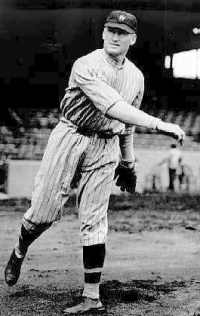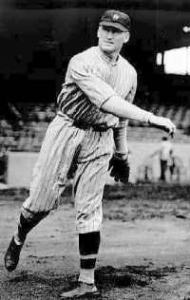September 29, 1913: Walter Johnson completes 11th shutout of season and 36th victory
Walter Johnson was on a roll of historic proportions as he prepared for his final start of the season. Beginning with his three-hit shutout against the New York Yankees in the second game of a doubleheader on September 5 for his 30th victory of the season, the Washington Senators hurler had yielded only two earned runs in his last 47⅔ innings, and won all six decisions. His 36th victory seemed a foregone conclusion when Connie Mack, owner-manager of the Philadelphia Athletics, trotted out a “kindergarten brood,” noted the Philadelphia Inquirer, instead of his regulars.1
Perhaps taking the group of ragtag green recruits for granted, the Big Train “did not exert himself,” opined Washington sportswriter J. Ed. Grillo in the Evening Star. “He loafed most of the day, and did not use a single curve ball.” Nonetheless Johnson was no ordinary pitcher and “hitting and scoring on him are two entirely different propositions,” continued the scribe.2
The second-place Senators (85-63) had no chance to catch the front-running A’s (95-52) in the final six games of their last homestand of the season. A Monday afternoon affair at National Park, the club’s two-year-old steel-and-concrete ballpark, drew a robust crowd of 15,000 spectators, with boys under 12 admitted free, to celebrate George McBride Day.3 (National Park was renamed Griffith Stadium to begin the 1920 season.) The captain of the club, McBride was widely considered the AL’s best fielding shortstop, a position he had held down for the Senators since 1908, his first season with the team. In a pregame ceremony at home plate, McBride was presented a diamond-studded watch fob from fans and US Vice President Thomas Marshall gave a short speech praising the hard-nosed, scrappy player. Described as McBride’s closest friend on the team, Johnson requested to pitch this game. Baseball’s most dominant pitcher, the 25-year-old sidewinder entered the game leading the major leagues with 35 wins, 10 shutouts, and a 1.12 ERA.
With the A’s third pennant in four years wrapped up, the Tall Tactician gave his starters the day off against Johnson’s heater. The club’s vaunted “$100,000 Infield” (Stuffy McInnis, Eddie Collins, Jack Barry, and Home Run Baker) were replaced by little-used rookie Billy Orr and three players making their big-league debut, Press Cruthers, Monte Pfeffer, and Harry Fritz.
The game commenced in “emphatic manner,” gushed D.C. sportswriter William Peet, when Tom Daly led off with a single and moved to third on Jimmy Walsh’s single.4 Fritz’s grounder put Walsh in scoring position before the Big Train buckled down, fanning Cruthers and retiring George Brickley on an infield popup. In the next frame, Orr “hammered a hot one through Johnson’s glove” with one out, noted the Washington Times, but Johnson recovered and punched out the next two batters.5
“Either Connie Mack has gathered about him a most promising bunch of youngsters,” suggested the Washington Herald, or the “team produced a feeling bordering on stage fright.”6 At no time was that more evident than in the fourth. Still looking shaky, Johnson served up a “slow ball,” which Brickley clubbed over the head of 17-year-old Cuban-born left fielder Merito Acosta, making his first big-league start, and scampered to third with a one-out triple.7 In a rare bout of wildness, the Big Train loaded the bases by grazing the sleeve of Pfeffer’s uniform with a pitch and then walking Orr. Another player making his major-league debut, Wickey McAvoy, grounded to McBride, who initiated a 6-4-3 inning-ending twin killing. Johnson must have decided he was done toying around after his second rough inning and held the A’s’ newbies hitless over the last 5⅔ innings. Sportswriter Stanley Milliken of the Washington Post noted that Nationals second baseman Ray Morgan “pulled the feature of the afternoon,” robbing Pfeffer of a hit by snaring his screeching liner in the sixth.8
Johnson’s uninspired pitching early in the game might not have been newsworthy had the Senators managed any semblance of offense against rookie Weldon Wyckoff (2-2, 5.10 ERA). The 22-year-old right-hander was coming off a bizarre complete-game victory, 10-9, over the Boston Red Sox at Fenway Park five days earlier, despite yielding 24 baserunners on 12 walks, 11 hits, and a hit batter. In this game, however, Wykoff did his best Big Train impersonation and held the Senators hitless for 5⅓ innings until McBride connected squarely for a single that left fielder Walsh misplayed, allowing the ball to go through his legs while the captain reached second.
Walsh’s miscue was symptomatic for the A’s fielding woes, including five errors, all afternoon in a game that Wyckoff deserved to win. Two innings earlier, an errant throw by Fritz and a flubbed grounder by Pfeffer put runners on first and third with two outs, but both were left stranded.
“In thrills the game was lacking in many respects and at times dragged considerably,” lamented the Post.9 Thankfully for the Post, the game was completed in a swift 1 hour and 25 minutes, with the sole run scored in a sloppy seventh. Chick Gandil led off with a single, the second hit Wyckoff surrendered, and then raced to third when Morgan beat out a slow roller to third base that Fritz probably did not charge. Rip Williams, making just his fifth start of the season as a catcher, hit a tailor-made double-play grounder to Pfeffer at short; however, keystone sacker Cruthers’ relay throw to first baseman Orr was high and pulled him off the bag as Gandil crossed the plate. Poor baserunning by the Griffithmen led to the next two outs: Williams was picked off first and Acosta was caught stealing after drawing a walk.
Washington’s 1-0 victory improved Johnson’s record to 36-7 and lowered his ERA to 1.09. The Big Train had a disastrous relief appearance in the season’s last game and was charged with two earned runs without retiring a batter, pushing his ERA to 1.14. It was by all accounts one of the greatest seasons by a pitcher in baseball history. Johnson led the majors in wins, complete games (29), shutouts (11), innings (346), strikeouts (243), and ERA. Johnson was awarded the third annual Chalmers Award, bestowed by baseball writers as an MVP-type award, which was discontinued after the next season.
Connie Mack placed little value on the outcome of this game, nor the next two against the Senators, both shutout losses, while he rested his starters so that they could be fresh for the World Series. His strategy paid off: The A’s defeated the New York Giants in five games for their third championship in four seasons.
Sources
In addition to the sources cited in the Notes, the author accessed Retrosheet.org, Baseball-Reference.com, SABR.org, and The Sporting News archive via Paper of Record.
Notes
1 “Johnson Had No Cinch Winning,” Philadelphia Inquirer, September 30, 1913: 12.
2 J. Ed. Grillo, “Doc Ayres to Face Mack’s Rookies in Game Today,” Evening Star (Washington), September 30, 1913: 16.
3 “Johnson Is to Pitch in ‘McBride Day’ Game,” Washington Post, September 9, 1913: 5.
4 William Peet, “Connie Mack’s Recruits Bow to Walter Johnson,” Washington Herald, September 30, 1913: 10.
5 “Mack’s Uniforms Played Fine Ball,” Washington Times, September 30, 1913: 12.
6 “Mack’s Uniforms Played Fine Ball.”
7 “Mack’s Uniforms Played Fine Ball.”
8 Stanley Milliken, “Nationals Defeat Athletic Youngsters 1 to 0 – Ayres to Pitch Today,” Washington Post, September 30, 1913: 8.
9 Milliken.
Additional Stats
Washington Senators 1
Philadelphia A’s 0
Griffith Stadium
Washington, DC
Box Score + PBP:
Corrections? Additions?
If you can help us improve this game story, contact us.



